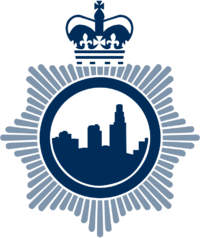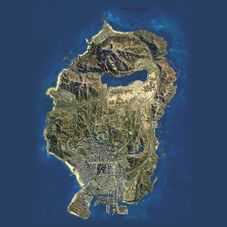GTA:Los Santos Police Service
| Abbreviation | LSPS | |
| Agency Overview | ||
|---|---|---|
| Formed | 22nd Febuary 2020 | |
| Employees | 280 Approximately | |
| Legal Personality | Police Force | |
| Jurisdiction | ||
| Operations Jurisdiction | San Andreas | |
| Size | 127km2 (49 sq mi) | |
| Population | Around 29 Million | |
| Structure | ||
| Overviewed by |
|
|
| Headquarters |
| |
| Agency Executives |
|
|
| Facilities | ||
| ||
| Website | ||
The Los Santos Police Service (LSPS) is the territorial police force responsible for law enforcement across San Andreas, covering an area of 127 km2.
See below for information on applying to Join the LS Police Service.
Operational Structure
The following chart shows the LSPS' structure, including its divisions, sub-divisions and what ranks you will find at what level within the service:
Police Command
The Silver Command is made up of three officers. One Chief Superintendent (C/Supt) and two Superintendents (Supt). These officers are responsible and ultimately accountable for the LSPS. The role is very managerial however they generally do not get involved in specific issues as the chain of command usually takes care of most day-to-day matters.
| Chief Superintendent | |
|---|---|
| Shane Jones | |
| Superintendents | |
| Shepherd Kingston | Barry Greenhalgh |
Response
Response are the bulk of the LSPS, providing the residents a gold standard policing. They are the team that you will see day to day. They will be the first to attend most incidents.
Frontline Policing
Frontline policing officers perform standard patrols around the Los Santos area whilst responding to incidents and 999 calls.
This is the primary area of the LSPS, responding to all kinds of incidents ranging from public disorder, misuse of drugs and anti-social behavior. Headed by an Inspector and 3 Sergeants, the main role of Frontline Policing is to be proactive and responding to various calls whilst also partaking in raids on addresses link to serious and organised crime. They utilize Incident Response Vehicles and Area Cars.
Roads Policing
Roads Policing officers are specially trained in enforcing road traffic laws and high speed pursuits. They are also trained in tactical pursuit tactics such as TPACs and Hard Stops in order to prevent offenders who attempt to escape via the roads. They utilize Traffic Pursuit Vehicles. Each vehicle performing Roads Policing duties is assigned the Romeo-Papa callsign.
Recruitment and Development
This is the entry stage into the LSPS, newly recruited officers will undergo their initial training (OST) and then be guided by Training Officers throughout their probation. After completion of a development plan, Probationary Constables will be promoted to Constable and assigned to a team within Frontline. Recruitment & Development is headed by an Inspector and 2 Sergeants, one focusing on teaching core skills to probationary constables and the other prioritizing the training in advanced skills of regular constables.
Criminal Investigations Department
The Criminal Investigations Department is the LSPS' investigatory department and is made up of plain-clothes detectives. CID undertake investigations into OCGs and serious and organised crime ranging from bank robberies to drug manufacturing. CID is headed by a Detective Inspector and Detective Sergeant. The CID follows a parallel rank structure to uniformed police consisting of Detective Constable > Detective Sergeant > Detective Inspector.
Specialist Operations
Specialist operations is a cluster of multiple specialist units.
Firearms Unit
Starting with the Firearms unit: Officers in this directorate consist of Authorised Firearms Officers (AFO) and Specialist Firearms Officers (SFO). They utilize Armed Response Vehicles (ARV) in Tactical Support Teams (TST) to respond to firearms and violent crime incidents, as well as working as Trojan proactive units as visible armed response vehicle patrols in areas of high crime to deter those who pose a threat. Each vehicle performing specialist operations duties is assigned the Zulu callsign while the officers inside have their own Trojan callsign.
National Police Air Service
Besides that is the National Police Air Service, officers in this directorate consists of pilots who pass flight training and tests. They specialise in air surveillance, pursuits and searching suspects. The members in specialist operations are the Inspector and Sergeant of NPAS, who are leading the unit. Everyone who is part of the unit as a pilot, are regular officers in Frontline and Traffic or command of Specialist Operations.
Dog Support Unit
The Dog Support Unit has a same structure as NPAS and MPO, where 1 inspector and 1 sergeant is leading within specialist operations, and the members are part of frontline, traffic or firearms. Dog handlers are highly trained to use dogs for searching, defending themselves and normal patrol duties. They utilize the Skoda Suburb.
Marine Policing Operations
The Marine Policing Operations is specialised in water operations, and lead by 1 inspector and 1 sergeant. They are trained in diving operations, and conducting costal/waterborne policing. They utilize 2 boats the island class patrol vessel and the artic RHIB and one land vehicle the ford ranger. Within the unit there are different levels of officers starting from police diver going up to 1st coxswain.
Ranks
The Los Santos Police Service uses the standard British Police ranks, indicated by shoulder boards (epaulettes), up to Chief Superintendent.
Officers and Trainees:
- Probationary Police Constable (P/Constable): Still in some stage of training.
- Police Constable (Constable): Has passed all basic training and is a fully fledged police officer. Most officers within the LSPS hold this rank.
Bronze Command:
- Sergeant (Sgt): First rank within Bronze Command and often includes further managerial duties.
- Inspector (Insp): Head of a division such as Firearms, CID or Frontline.
- Chief Inspector (C/Insp): Oversees multiple divisions as the head of either Response or Specialist Operations.
Silver Command:
- Superintendent (Supt): First rank within Silver Command. Oversees the entire police force.
- Chief Superintendent (C/Supt): The LSPS' highest rank and is hence ultimately responsible and accountable for the LSPS as a whole.
| Training Ranks | Police Officers | Bronze Command | Silver Command | ||||
|---|---|---|---|---|---|---|---|
| Probationary Police Constable | Police Constable | Sergeant | Inspector | Chief Inspector | Superintendent | Chief Superintendent | |
| Epaulette | |||||||
| Paycheck | £ 140 | £ 160 | £ 180 | £ 210 | £ 230 | £ 250 | £ 300 |
| Officers in an investigatory department have the 'Detective' prefix in front of their rank. This signifies their specialised role but does not give them extra authority over uniformed counterparts. | |||||||
Police officers are paid according to a uniform pay scale, which increases with each promotion, starting at £140 for PPCs up to £300 for C/Supts.
Joining the Police Service
In order to join, aspiring recruits have to fill out the official Police Application Form on the government website and, once received, applications will be reviewed by the Police Command.
Resources
Fleet
The Los Santos Police Service operates and maintains a fleet of various types of vehicles which are used for a range of duties, these include:
- Incident Response Vehicles (IRV): Used for patrol and 999 emergency response.
- Traffic Pursuit Vehicles: Used by Roads Policing Units to enforce Road Traffic Rules and pursue those who attempt to escape via the roads.
- Armed Response Vehicles (ARV): Used by Firearms to transport their AFOs, SFOs and CTSFOs to incidents.
Vehicles
Incident Response Vehicles (used by Frontline)
- Peugeot 308 2017
- Skoda Octavia Estate 2020
- Vauxhall Insignia Estate (White)
- Ford Mondeo Saloon 2017 (Unmarked)
Traffic Pursuit Vehicles (used by Roads Policing)
- Audi A4 (Normal + Interceptor)
- Volvo V90 (Normal + Interceptor)
- BMW 3 Series (Normal + Interceptor)
- BMW M5 (Interceptor)
- BMW 530d F11 2014 (Unmarked)
Armed Response Vehicles (used by Firearms)
- Volvo XC90
- BMW 330D Saloon
- BMW X5 40d XDrive
- Police Rancher (Unmarked)
- Fort Ranger 6S (Unmarked)
- BMW X5 (Unmarked)
- BMW 540i
Detective Vehicles (used by CID)
- Volvo V90 (Unmarked)
- BMW 540i (Unmarked)
- Range Rover SVR (Unmarked)
Miscellaneous & Specialised
- Mercedes-Benz Sprinter (Riot Van)
- BMW R 1200RT (Police Bike)
- Skoda Suburb (Dog Car)
- Airbus Helicopters H135 (NPAS Helicopter)
- Volkswagen Amarok
- Ford Ranger (MPO)
- Island Class Patrol Vessel (MPO Boat)
- Artic RHIB (MPO Boat)

